MercoPress. South Atlantic News Agency
Tag: Argentina Central Bank
-
Thursday, April 25th 2019 - 21:48 UTC
Economic collapse in Argentina worsens in a volatile day: Macri blames uncertainty
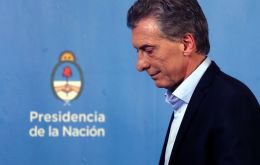
Argentina lived on Thursday another day in which the dollar rebounded and the country risk exceeded 1000 points. President Mauricio Macri criticized the “short-term” view of the markets and the Central Bank (BCRA) had to intervene by positioning the interest rate at 70% and diverting the futures market to contain the demand on the currency, preventing it from reaching the maximum accorded of 51.45 pesos.
-
Tuesday, April 16th 2019 - 09:19 UTC
Argentina begins IMF approved daily auction of US$ 60m to recover Pesos
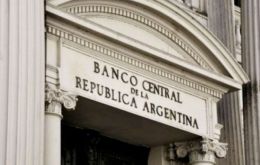
Argentina sold US$ 60 million in the foreign exchange market on Monday, traders said, marking the start of peso-buying program approved by the International Monetary Fund and aimed at bolstering government finances.
-
Wednesday, March 27th 2019 - 20:54 UTC
Dollar rises in Uruguay while tension increases in Argentine markets

In Uruguay, the dollar traded at noon on the state bank Banco Republica (Brou) board at $ 33.20 for the purchase and $ 34.60 for the sale, 45 cents above the close price on Tuesday. On the board of private exchanges, the currency to the public came to sell at $ 34.80 and $ 34.90.
-
Saturday, February 2nd 2019 - 08:59 UTC
Argentine central bank “ready” to counter surprises ahead of this year's presidential election
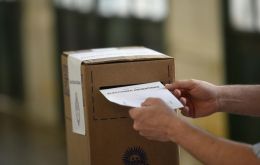
Argentina’s central bank has sufficient dollar firepower to deal with a spike in demand for the greenback if uncertainty over the country’s upcoming presidential election prompts another run on the peso, bank sources said on Friday.
-
Wednesday, January 23rd 2019 - 09:14 UTC
Argentine central bank intervenes to support the US dollar: buys US$ 50m
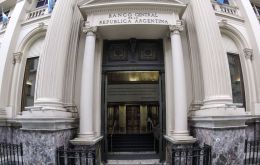
Argentina’s central bank said it bought US$ 50 million at an average price of 37.597 Pesos per dollar in the foreign exchange market on Tuesday, part of its effort to maintain the currency in a trading band agreed with the International Monetary Fund.
-
Tuesday, November 27th 2018 - 09:27 UTC
IMF praises Argentina's reforms program and anticipates rebound of activity in 2019
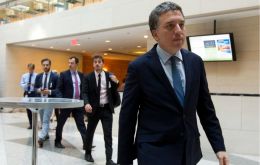
The International Monetary Fund has completed its second review of Argentina, the fund said on Monday, paving the way for the country to receive US$7.6 billion under a US$ 56.3 billion financing deal.
-
Saturday, November 10th 2018 - 09:16 UTC
Argentina's central bank almost doubles currency swap with China
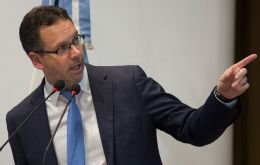
Argentina’s central bank said it would nearly double its currency swap deal with China, bringing the total to 130 billion Yuan (US$ 18.7 billion), as Beijing looks to expand its influence in the recession-struck country. Central Bank President Guido Sandleris, who was in China finalizing the agreement, said that the deal for 70 billion Yuan would be expanded by 60 billion Yuan, according to a bank spokesman.
-
Wednesday, October 24th 2018 - 08:40 UTC
Argentine Peso slips on Tuesday; central bank sells debt notes at a rate of 71.39%

Argentina’s peso slipped on Tuesday, a day after the central bank’s new governor reassured the public that its approach to taming the country’s rocky economy would be sustainable over the medium term. The peso closed 0.46% weaker at 36.65 per U.S. dollar. The currency has fallen 0.30% against the dollar this week, although it has climbed 12.63% since the beginning of the month.
-
Tuesday, September 25th 2018 - 21:35 UTC
Who is Guido Sandleris, Argentina's Central Bank president after the surprise resignation of Caputo
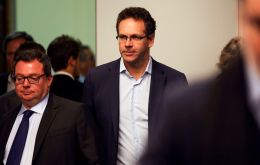
The resignation of Luis Caputo to the Presidency of the Central Bank of Argentina (BCRA), which has been reflected with surprise by the international media, occurs amid the trip of the Argentine President, Mauricio Macri, to New York to attend the Assembly General of the UN and with the mission of restoring the confidence of the international market in the Argentine economy. His predecessor, Guido Sandleris, receives a Central Bank when it is about to close an agreement with the International Monetary Fund (IMF).
-
Friday, September 21st 2018 - 09:32 UTC
Argentine Peso recovers strongly and with no support from the Central bank
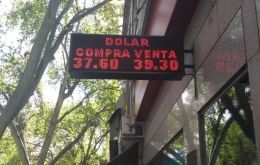
The Argentine Peso reacted strongly against the US dollar on Thursday following on an abundant private supply of greenbacks to satisfy demand, which kept the Central Bank out of the market for the first time since the beginning of the month. The dollar fell 2.8% and ended trading below 39 Pesos.
